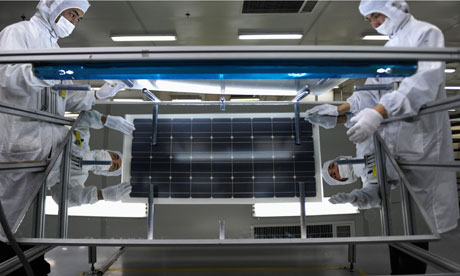Solar energy potential underestimated, says Greg Barker from the Guardian Online
The UK overlooks the benefits and overestimates the costs of solar, according to the energy and climate minister - please note that this article is taken from the Guardian's website.

Britain has underestimated the potential of solar energy and the government needs to reappraise the technology because of rapidly falling costs, according to energy and climate minister Greg Barker.
"Historically, the Department of Energy and Climate Change (Decc) has underestimated the contribution that solar can make," he said. "But solar is now going through an extraordinary stage of development … it's capable of scaling up and competing with the big boys. It's not just for enthusiasts. It has potential to be a significant source of energy."
Barker's comments were made in response to a report issued today by the Solar Trade Association (STA), which claims the government and its advisers have underestimated the benefits and overestimated the costs of solar energy.
"While I wouldn't necessarily concur with all the specific recommendations of the report," Barker said, "there is one clear message that I do agree with: that solar has far more potential than has previously been thought."
Despite these statements, Barker plans to press ahead with plans to slash the subsidy given to large-scale solar installations via the feed-in tariff scheme (Fits) – a move that the STA chairman, Howard Johns, claims could "decapitate" or even "destroy" Britain's fledgling solar industry.
Asked how he can reconcile his statements about solar's potential with the cuts to the Fits, Barker replied: "I'd like to be able to be more generous with the large-scale projects, but I've got £860m from the spending review … so the focus of the current scheme needs to be on the small scale, to get the maximum number of installations. But we now need to think creatively about how we can engage commercial-scale solar as a more important part of the energy mix … we've got to find additional pathways – and that means changing the way that solar is perceived in the department."
The report also claims that the government and its advisers – the Committee on Climate Change (CCC) – have misunderstood the economics of solar power.
In its recent renewable energy review, the committee advised the government that solar's role in the coming decade "should be limited" due to "current high costs and limited UK impact on global costs". Britain may do better to "buy in [solar panels] from overseas later", the CCC concluded.
The STA claims this analysis is flawed because unless the UK solar industry continues to scale up, there won't be the capacity to actually install large quantities of panels as prices drop.
In addition, the report argues that solar is already much less expensive than the CCC suggests. In their analysis, the CCC compares the cost of solar electricity with the wholesale price of generating power from sources such as gas and nuclear. This is an "apples with pears" comparison, according to the STA, because most of the final costs to the consumer of nuclear and gas power are accounted for by transmission and supplier profits, not generation. In contrast, solar delivers energy directly to buildings and therefore should instead be compared with the retail power price, according to the STA – a change that would slash solar's perceived cost.
A spokesperson for the CCC disagreed with this claim: "The argument runs that solar PV does not need to use the power network, and therefore that investment in solar PV saves network costs. However, given that we will continue to have power networks, and that the costs associated with these are mainly fixed, there is only very limited network cost saving – due to avoided network losses - from investing in solar PV. So when considering the economics of solar PV from the perspective of UK plc, the relevant comparator is the wholesale price."
Barker said that he agreed with the CCC that "even if you install a huge amount of solar, you're still going to want access to the grid", but he acknowledged that "there is clearly a point in what [the STA] say. Solar is different from other technologies and that needs to be recognised. We need a more sophisticated level of analysis."
Another key point of debate is the rate at which solar prices will come down and how soon the technology will be able to compete on cost without subsidy – so-called grid parity. Today's report cites recent research by consultants A T Kearney that suggests grid parity will arrive by 2019 in the UK, and much sooner in some other European countries. But the CCC expects solar to remain expensive for much longer.
No comments:
Post a Comment